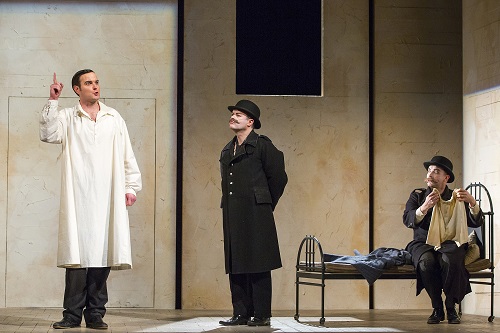 United Kingdom Philip Glass, The Trial: Soloists of Scottish Opera / Derek Clark (conductor), King’s Theatre, Edinburgh, 3.2.2017. (SRT)
United Kingdom Philip Glass, The Trial: Soloists of Scottish Opera / Derek Clark (conductor), King’s Theatre, Edinburgh, 3.2.2017. (SRT)

Cast:
Josef K – Nicholas Lester
Guard 1/Block – Daniel Norman
Guard 2/Priest – Paul Carey Jones
Inspector/Uncle Albert – Michael Druiett
Frau Grubach/Washerwoman – Emma Kerr
Leni – Hazel McBain
Magistrate/Lawyer Huld – Gwion Thomas
Titorelli – Elgan Llyr Thomas
Production:
Director – Michael McCarthy
Designer – Simon Banham
Lighting Designer – Ace McCarron
Philip Glass’s opera, based on Kafka’s The Trial, was first seen at the Royal Opera House in 2014. Scottish Opera was one of its co-commissioners, and it’s now their turn to show it.
The most striking thing about it is the success of Christopher Hampton’s libretto, condensing the essence of Kafka’s fable brilliantly. He distils the action into two 50-minute acts, and gets inside it beautifully. The first act is blackly comic, with the two guards that we can never quite take seriously, even as they are being flogged, and the many bizarre happenings in the courtroom. The second act takes a turn towards the dark, however, moving through Josef K’s hope at his new lawyer and his new lover, through to a black-as-night confrontation with the prison chaplain and his ultimately bizarre execution “like a dog.” Hampton’s text gets this just right, choosing and trimming what he needs and gauging the mood very well. He is helped by the dark humour of Michael McCarthy’s production and, especially, Simon Banham’s washed-out sets, complete with their many windows which tap into the novel’s important theme of voyeurism. Importantly, the conventions of the genre mean that the text unfolds very slowly over the course of the evening, allowing the listener to get inside it and be drawn into its darkening mood in a way that you couldn’t really do if it was straight theatre, and it was a wise decision of Scottish Opera’s to have the surtitle screen, even though the piece is sung in music.
That said, I’m not convinced that it works as opera. Glass’s music is full of his trademark chugging patterns and circular rhythms, which I’ve always felt go on for just that little bit too long in any of his music that I’ve heard live. However, whereas in the large scale works like Akhnaten or Einstein on the Beach, he manages to create a huge sound world that manages to win you over (or beat you into submission), that’s not possible with a chamber opera. The thirteen musicians just don’t have the scale or variety of texture that his music often depends on, and their music sounded thinly stretched and sometimes trapped in a cul-de-sac. Most damagingly, on very few occasions did the music consciously add something to the on-stage drama, which is surely the very thing that opera is meant to do. In one transition scene in the first act, for example, we see K being consumed by despair and hopelessness, but the very same music could just as appropriately have been used to evoke his transcendence or rising above it.
The cast did very well and, for all the paucity of their musical material, gave it their maximum commitment. Nicholas Lester crowned the whole thing as a noble yet humane K, and Elgan Llyr Thomas made a strong impression in the comic role of Titorelli the painter. I also liked the sweet yet crazed soprano of Hazel McBain as K’s short-term girlfriend Leni, and the dark power of Paul Carey Jones as the prison chaplain was one of the most memorable scenes.
Still, while a good night at the theatre, it ultimately fails in one of the fundamental duties of opera; namely to make the music enrich the drama. Here, the text is king.
Simon Thompson